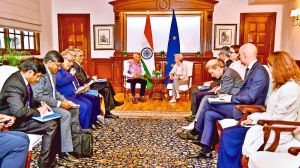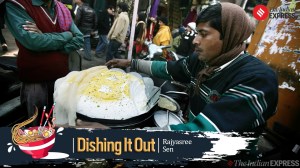After coercive, now diplomacy
It is usually very tempting to persist forever with something that8217;s done rather spectacularly well. Over the past couple of months the...

It is usually very tempting to persist forever with something that8217;s done rather spectacularly well. Over the past couple of months there were genuine concerns that the government might end up in the same trap on coercive diplomacy. It had achieved a great deal. But Musharraf wasn8217;t about to give India the break it needed to move on to any next step that would include, and justify, a pullback of its forces. Let India find its own face-saver, he would often say, and that he did not care how long the forces sat on the borders.
The Cabinet Committee on Security has now acted wisely in denying Musharraf that ego clash. The border build-up had served its purpose and there was no gain to be had by pushing it into its second winter. Given the testosterone-driven nature of the build-up and the rhetoric of the past 10 months, this wasn8217;t easy. The expectations of a population, whose only idea of a war is either the punitive American bombing missions here and there or the limited Kargil conflict, had been raised. As if India was about to finish the military junta in Pakistan and clean out the camps on POK just as the Americans had done with the Taliban and Tora Bora. From the spirited urgings of the VHP and RSS to the vicious taunts of Balasaheb Thackeray, the pressure to take the build-up to its 8216;logical conclusion8217; was immense.
Except, the rhetoricians never appreciated that a war was not to be the logical, or at least the preferred, conclusion of the build-up. On the contrary, the build-up was to avoid the inevitability of war in the long run. If India had demonstrated lesser resolve after the attack on parliament it would have emboldened terrorists and their handlers to take similar chances again. Keep trying. Keep pushing the shaky wall of Indian resolve. One day it will collapse. Then Kashmir, and who knows more, will be yours. The military build-up was India8217;s response to that mindset. That if there was going to be another attack of the kind, there might be retribution, whatever the consequences.
It was also a message that India was now closing forever for the Pakistanis the option of a low-cost, low-intensity war with timings, places and weapons of their choosing. The build-up was designed to scare the Pakistanis sufficiently remember the nervousness on Musharraf8217;s face as he shuffled up and down at the SAARC summit at Kathmandu in January? into believing that India was drawing the line. Also, that it would get the international community alarmed enough to pressure Pakistan into moderating its behaviour.
|
A message is soon likely to go out to Pakistan, that were it to persist with the weapon of terror, the response will be an Indian counter-strategy which may be non-military yet crippling. You have to acknowledge that this government has achieved a genuine victory without war |
In a region inured to so much bluff and bluster, so many near-war situations in the recent past 1987, 1990, 1993, 1999, such a strategy had to look very convincing to work. As I once wrote at the peak of the crisis, it had to be so convincing even we believed we were going to war. This build-up was no sham. It was as close to the real thing as possible and that is why it worked. It is also because it worked that now it8217;s been possible for the government to pull back and contemplate diplomatic and political follow-up. A message is soon likely to go out to Pakistan that India has more cards up its sleeve and, that were Pakistan to persist with the weapon of terror, the response will be an Indian counter-strategy which may be non-military yet crippling. It is usually most grudgingly that you would send out such tributes to any government of the day and, also, it would have to do really well to deserve these at a time when it8217;s only hitting the headlines routinely for its incompetence, infighting and waffling on crucial issues, particularly economic reform. But you have to acknowledge that this government has achieved a genuine victory without war.
Only earlier this week Balasaheb mocked and mimicked the prime minister for not having the nerve to carry out his threat of a decisive war aar-paar ke ladai. Somebody needs to give him a tutorial as to how decisive this war has already been without having been fought. It was a popular belief, but a mistaken one, that the military deployment was actually going to lead to a final war, the ultimate communal riot with tanks and nukes that would settle not just the Kashmir issue but India8217;s Pakistan problem for ever. On the other hand, a more realistic expectation was that it would help us stabilise the situation in Kashmir, bring its people back into the electoral mainstream and, finally, bring Pakistan on the negotiating table, but this time more on our terms, both optically and substantively.
|
Just as it was tempting to keep the forces on the border forever, it would now be easy to wait for too long. Just like the deployment, the pullback has been a pro-active Indian move. This has to be followed by the unveiling of the next phase in our politico-diplomatic strategy |
Thackeray may not appreciate these for they so totally lack blood and gore, but the gains of this strategy have been remarkably far-reaching. An election that looked so unlikely on December 13, last year, has just been completed so creditably. The Pakistanis have been forced to make so many public promises of ending cross-border terrorism. And even if they haven8217;t kept these fully, and even if we continue to cry betrayal, ask any senior armed forces or intelligence officer charged with fighting terror in Kashmir and the story would look a little bit different. In the first nine months of this year, the armed forces have suffered only around half the casualties recorded in the corresponding period last year. The number of terrorists killed is nearly twice as much. This is in spite of the increase in armed forces8217; casualties during the elections since so many units were sucked into poll duties, upsetting the counter-insurgency grid. The government may not say this for obvious reasons. But this military/diplomatic coercion has reduced terror attacks to less than a half in spite of the elections. But for this, it would have been less likely that so many Kashmiris would come out and vote, defying the terrorist threat.
The pull-back gives both sides the respite to think about their next moves. Just as it was tempting to keep the forces on the border forever, it would now be easy to wait for too long, savouring the gains of coercive diplomacy and thereby lose initiative. Just like the deployment, the pullback has been a pro-active Indian move. This has to be followed by the unveiling of the next phase in our politico-diplomatic strategy. Colin Powell was absolutely correct in stating that Kashmir is now on the international agenda. But never in the past was that so close to the larger Indian worldview as it is today. If Vajpayee can seize this moment now, he could fulfil one crucial mission he had set himself as prime minister. Thackeray, meanwhile, can be left alone to discover a new career as a stand-up comedian.
Email the author
- 01
- 02
- 03
- 04
- 05































